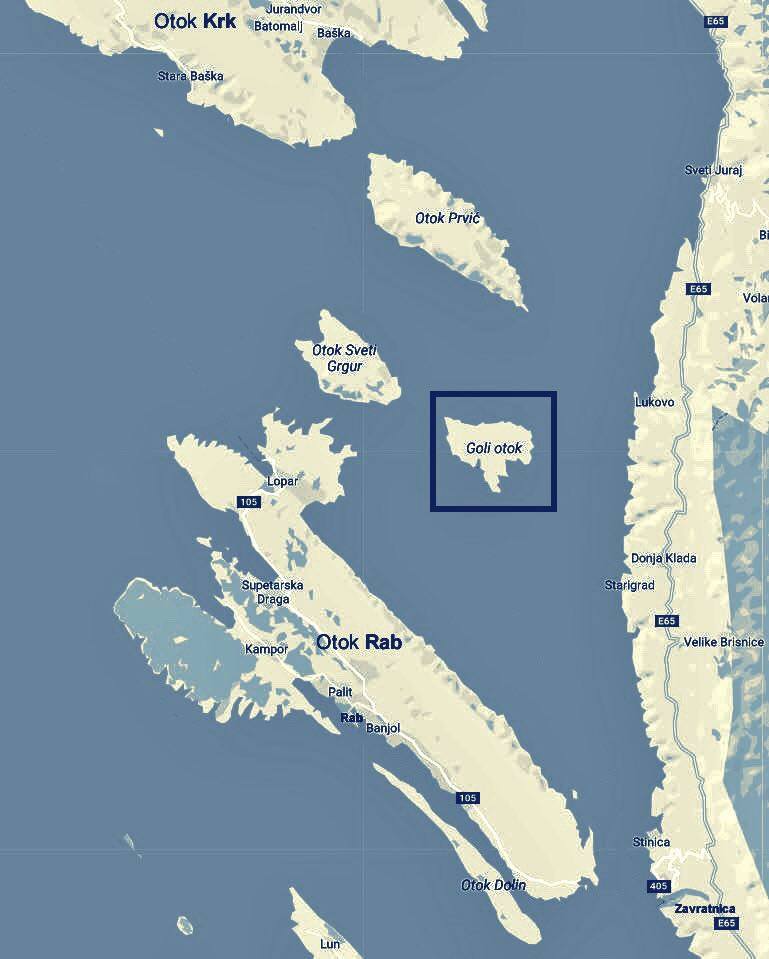CROATIA

During the 20th Century, Yugoslavia underwent two drastically different political constitutions, existing first as a Kingdom (1918 until 1941), and then as a Socialist Federation (1945 until 1992). Throughout its existence as a Socialist Federation and under the leadership of Grand Marshal Josip Broz Tito, the barren island of Goli Otok off the coast of Croatia, was consistently utilised as a prison island for political prisoners, although there were various periods of heavier usage within this period.

The result of the Second World War for Yugoslavia was a victory for Socialism and Communist values, due to the expulsion of the Axis forces by the Communist Partisans in the region. Allied forces, namely Britain, helped during this war time period, favouring the instillation of either Socialism or the Royalists (Chetniks) over the Fascists, for obvious reasons. The Red Army had also helped somewhat with the defeat of the Fascists in the region, however in comparison to other Eastern European countries, their involvement had been minimal. Nevertheless, Tito developed a positive relationship with the Soviet Union and they continued to perpetuate the notion of Yugoslavia as a state built on 'Brotherhood and Unity'. In 1946, Yugoslavia became officially known as the Federal People's Republic of Yugoslavia and consisted of the Baltic nations of Slovenia, Croatia, Serbia, Macedonia, Montenegro, and Bosnia and Herzegovina. In 1947 this Yugoslavian federation joined the Cominform, which consisted of the eastern bloc countries as well as the dominant power of the Soviet Union. However, due to differences between Stalin and Tito, Yugoslavia was removed from the Cominform, and a period of paranoia and suspicion of their Socialist neighbours set in in Yugoslavia.
Following the expulsion of Yugoslavia from the Cominform in 1948, internal exile as well as various other punishments were exacted on those who disagreed with Tito's handling of Yugoslavian-Soviet relations. It has been noted that the Socialist policies of Yugoslavia were largely derivative of Stalin's, prior to their expulsion from the Cominform, however once the rift between Stalin and Tito was apparent, Tito had to re-organise his image to that of 'anti-Stalinist and liberal minded. One of the core ways in which this was achieved was through the economic models introduced to Yugoslavia. The self-management system that was implemented aimed to decentralize economic power and implement more freedoms in decision making for the working class. The result of this change was the start of economic prosperity for the Federal Republic of Yugoslavia. However, despite the improvements that Yugoslavia was experiencing, Tito received criticism from within the country and members of the political community. The Soviets continued to be a threat to both Tito and Yugoslavia, resulting in harsh treatment of Soviet sympathizers. Nevertheless, Yugoslavia took a non-interventionist stance during the Cold War and was open to Western influence in certain spheres, having adopted Western style, and participating in international festivals such as the Eurovision Song Contest, unlike other Socialist countries during this time.
The second aspect of Yugoslavian history that resulted in vigorous state oppression, was the nationalism and the desire for autonomy that Yugoslavian states within the Socialist Federal Republic exerted. During the Second World War there had been three main groups vying for power within the Balkan states; The Croatian Utashe (who sided with the Axis forces); the Chetniks (Serbian Royalists); and the Partisans (Communists under Tito's leadership). The Utashe had followed the Fascist ideology and had persecuted many Serbians and Communists, employing concentration camps for their disposal amongst other forms of horrific punishment. Despite the defeat of the Utashe during the Second World War and the establishment of Socialism within the Yugoslavian states, individual nationalism persisted, and it appears to have been a painful reminder of the atrocities caused by groups such as the Utashe. One chapter of Yugoslavian history, known as 'Croatian Spring' during the early 1970s highlighted Tito’s intolerance of autonomy within the federal state make up of Yugoslavia. Croatian Spring was the result of economic indifferences within the Yugoslavian model, among other factors, as the Croats became frustrated by the more significant monetary contribution that they made to the federation in comparison to other less prosperous areas of Yugoslavia . The tensions of Croatian nationalism continued with increasing amounts of Croatian flags and rumors of the revival of the Utashe. Tito's frustration at the resurgence in Croatian nationalism was apparent, with many Croatian nationalists receiving sentences at Goli Otok. A new federal constitution was introduced in 1974 and provided the states with a greater deal of autonomy, but this did not curb nationalist desires entirely, and after almost two decades the Yugoslavian wars began.